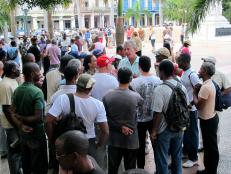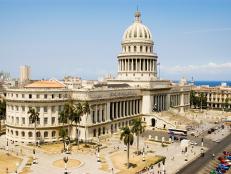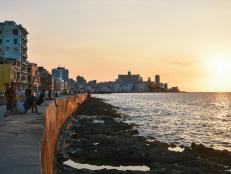10 Things You Need to Know About Visiting Cuba in 2019
We turned to both U.S.- and Havana-based experts to clear up confusion on how to plan a visit to Cuba — and why there’s no time like the present to get started.

Related To:
lessRelated To:
Give Cuba a Try
Cuba’s capital city celebrates its 500th anniversary this November, and visits to the "Pearl of the Antilles" are on the rise. The Cuban Ministry of Tourism recorded 4.75 million international visitor arrivals in 2018 (up from 4.5 million in 2017), and the island nation expects to welcome 5.1 million visitors this year. That said, while the U.S. is one of Cuba’s top three travel markets, tour operators and service providers report ongoing confusion from their clients as to the legality and logistics of visits from the States. Travel Channel consulted U.S.-Cuba travel experts to get the latest — and clearest — need-to-know details.
Most Tourist Regulations Haven’t Changed
Individual travelers who once saw Cuba with "People-to-People" licenses can now do so with "Support for the Cuban People" licenses. American tourists can still book group "People-to-People" trips, in turn, with licensed tour operators.
"Support for the Cuban People" licenses require travelers to stay in a casa particular (that is, a private residence) rather than in a hotel, eat in paladares (that is, privately-owned Cuban restaurants), and shop at private stores that are operated by self-employed Cubans. As to what does and doesn’t constitute an acceptable "full-time schedule of activities," think 'volunteering with an approved local charity and visiting local art museums on rented bicycles' rather than lounging on a beach.
"People-to-People" licenses, on the other hand, are now issued for visitors accompanied by guides. These visitors don’t have to choose their own local vendors or develop their own full-time itineraries (which focus on educational cultural activities like experiencing local art, music and dance). They do, on the other hand, pay a premium for the convenience of having tour operators develop ready-made trips that satisfy the American government’s requirements.
The State Department Recently Changed its Travel Advisory
In February of 2018, the U.S. State Department issued a Level 3 travel advisory that directed American citizens to "reconsider travel" to Cuba, "due to health attacks directed at U.S. Embassy Havana employees." That was devastating for many tour operators: according to a survey by the Center for Responsible Travel (CREST), a nonprofit research group, 95.24% of respondents involved in "People-to-People" travel cited the advisory as a reason for the decline in bookings more than 80% of them experienced between the first half of 2017 and the first half of 2018. In August of 2018, however, the State Department downgraded the advisory to Level 2, or "exercise increased caution" — which, as CREST experts note, is the same category as most of Europe. The majority of the respondents in that same survey expect their bookings to increase this year.
You’ll Need a Visa (But Your Airline or Tour Provider Can Help)
"Ever since they introduced direct flights to Cuba, [U.S. air carriers] have played a role in [two] aspects of the legal dimension of travel to Cuba. One is that you need a visa to go to Cuba. The airlines have visas that they can fill in for you at the airport," Robert Muse, a Washington, D.C.-based lawyer and expert on Cuba policies and travel regulations explains.
"The second aspect of travel to Cuba," he continues, "is compliance with U.S. embargo regulations. The airlines also play a role in that: They’ll direct a traveler to what they believe to be the proper category for their travel." For example, "if [someone is] part of a religious delegation, [their air carrier will] show them which box to check for that purpose. If someone’s traveling to Cuba as part of a 'People-to-People' group, the organization itself is licensed to perform that activity, so you don’t need an individual license from the Treasury Department."
You Should Keep a Detailed Itinerary of Your Activities
"Every traveler should keep a daily log of what their activities are," Muse says. This is especially true for independent travelers visiting Cuba with a "Support for the Cuban People" license, since each day of their trip must consist of a full-time (read: 9-to-5) schedule of activities that "enhance contact with the Cuban people, support civil society, or promote the Cuban people’s independence from Cuban authorities." (If you’re interested in that sort of travel, it’s worth reading up on the examples and prohibitions given in the legislation linked above.) Visitors to Cuba traveling with licensed groups or on shore excursions from cruise ships, in turn, receive schedules from their tour or cruise operators. Travelers of all kinds should retain receipts and maintain a journal of "meaningful interactions" with Cubans, since the U.S. Treasury Department’s Office of Foreign Asset Control (OFAC) can require you to provide them for the five years following your trip.
Shore Visits Are Still Relatively Simple
By December, it’s expected that more than 850,000 travelers will have visited Cuba from cruise ships this year — and 70% of those visitors will have arrived from America. Cruise enthusiasts will soon have more options than ever before, as Seabourn Cruise Line and Virgin Voyages will begin operating ultra-luxury and adult-only cruises to the island this fall and next year. "The cruise ships going to Cuba have tours that they offer, and they have worked to comply with at least the broad meaning of U.S. regulations so that they have meaningful interaction with Cuban people as part of this," explains Martha Honey, the executive director of CREST. "But... this is not closely monitored, or at least it hasn’t been up until now, and the cruise tourism — of all the sectors — has been the least affected by any of the [U.S. government] policy changes to date. So it’s been a little bit loose." Translation: If you’re going ashore for an afternoon, you’re not expected to maintain the same full-time schedule applicable to overnight visitors.
You’ll Need (Lots of) Cash
In most cases, American credit, debit and ATM cards won’t work in Cuba, which means you should pay for your lodging ahead of time, if possible, and have all the cash you’ll need for your trip on hand when you arrive. There are two official currencies in Cuba: The Cuban Convertible Peso (or CUC) and the Cuban Peso Nacional (or CUP). CUC are accepted everywhere, and many businesses that cater to tourists (like hotels, museums, restaurants and bars) only accept CUC. Accordingly, experts recommend you convert the majority (if not all of) your cash to CUC. CUP, on the other hand, can be useful at destinations like local markets and restaurants, and for purchasing food from street vendors. If you plan on converting cash at a Cuban bank, know that you’ll be charged an additional 10% for changing US dollars to CUC, and that many airports won’t allow foreigners to convert their currency into CUP (so you’ll have to convert to CUC first).
You Should Know When and How to Tip
Since CUC (the aforementioned convertible pesos) are accepted everywhere, gratuities offered in that currency are most beneficial to their recipients. Tip between 10 and 15% at restaurants and bars, and give other service providers — everyone from maids and porters to taxi drivers and rental car agents — $1 CUC per service (that is, each time they prepare your room, carry a bag or facilitate a trip). Tour guides and drivers should receive between $2 and $5 CUC per person, and specialized drivers and guides (if you’re taking an extended trip) should receive between $50 and $100 CUC per provider, per week.
You’re Going to Be (Somewhat) Unplugged
Most Cuban hotels provide internet access, and Wi-Fi is available in some parks and other public locations. That said, as CREST’s experts put it, "Cuba remains refreshingly disconnected" (read: most Cubans don’t have mobile data plans), and they recommend downloading a pair of apps that will function offline: AlaMesa is useful for restaurant locations and MAPS.ME offers offline maps complete with turn-by-turn navigation. Other pros suggest Triposo, which provides downloadable region- and city-based maps, guides and local tips.
Lodging Options Are Increasing — and Prices Are Coming Down
Collin Laverty, the president of Cuba Educational Travel (an organization that coordinates and curates cultural, educational, event, incentive and luxury trips to Cuba), notes that overnight stays in Cuba have undergone radical changes since U.S. policy shifts beginning in 2011 made them possible for broader categories of American travelers. In those first years, he explains, "we got to a situation where you almost couldn’t get a hotel room in Havana many nights of the year, and because of supply and demand, you were paying Hong Kong prices for less than superb lodgings." That’s no longer the case: Airbnb launched in Cuba in 2015 with 1,000 listings, and today there are more than 30,000. "You have online booking sites like Booking.com and KAYAK [with local offerings], so all of those things have made it easier and more normal to travel to Cuba. Now there’s more of an equilibrium between international prices and the quality of what you’re getting and the prices you’re paying."
Now Is the Perfect Time to Visit
The 13th Havana Biennial — postponed last year as a result of an overwhelming hurricane season — returns in force this April and May, and visitors from around the world will be traveling to Cuba for the nation’s largest visual arts event. The 15th International Film Festival of Gibara, in turn, will celebrate Cuban independent filmmakers this June. Carnaval de Santiago de Cuba — hailed as one of the largest celebrations in the Caribbean — takes place from July 18-27, and Havana will rumba en masse for the third annual El Rumbazo music festival November 7-11 (just in time for the official 500th anniversary celebration, on November 16th). "Culture is obviously one of the strong points in Cuba, and it’s one of the draws for American travelers," Laverty says, "and there’s just so much happening — in terms of music, dance, art — which is top notch, and there’s incredible innovation and excitement happening now." What are you waiting for?





